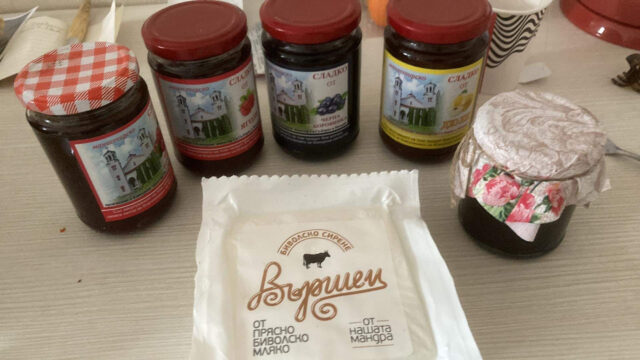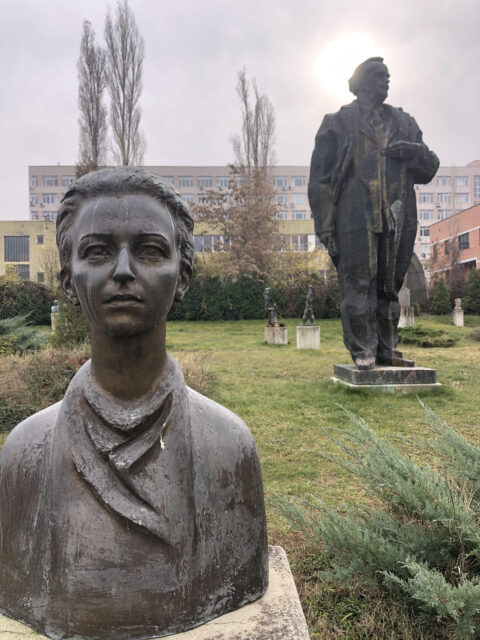Did you know that the world’s finest rosewater comes from Bulgaria? Whether Damask or White roses, they are harvested in the early morning into willow branch baskets which do not disturb the dew still clinging to them. And did you know that the Cyrillic alphabet was invented in Bulgaria? What about yogurt? It’s in the name. Lactobacillicus bulgaricus. Sheep’s milk. Superior. Now you know.
Ethnic Bulgarians rest upon 8,000 years of indigeneity (particularly in the cities of Stara Zagora and Plovdiv), and 5-10% of the population are Roma, the largest group outside of Romania. Bulgarian folk music contains a combination of asymmetrical rhythms and monophonic singing which varies not only in rhythm but pitch.
I’m telling you these things now because you might enjoy visiting Bulgaria and you might not have the privilege of meeting a smart, hot Bulgarian transman to show you around, like I did. I’ll feel sorry for you on the latter count, but I hope you do visit.

My sweetie, Vijay, lives in the capital city of Sofia.
You might be thinking: but I thought Bulgaria was unfriendly to the LGBTQ+ community?
Well, sort of.
“For people who pass as females, it is OK to hold hands with your lover in Sofia (especially in the city center). For men, it is not recommended, and transgender women have to be careful on the streets if their look can be deemed “too flamboyant,” Vijay tells me.
“Bulgaria has struggled to develop its queer scene since the 90s. But thanks to multiple activists, many of whom graduated from Western universities and went back, the scene has flourished despite all the setbacks,” he continues.
I was in touch with a few queer groups in Bulgaria in anticipation of my visit. They were welcoming and we almost worked out a speaking event or two. My visit happened to be in November, just before the annual Sofia LGBT Community Fest, and organizers were thin, so we left the idea for another time. Vijay confirmed that what I experienced – both the friendliness to international queer visitors, and the overwhelm, were due to the opposition queer groups still face in Bulgaria.
“A queer scene in the real sense exists only in Sofia. Bulgarians have had a community center, the Rainbow Hub, for the past 8 years or so. It used to be a tiny shed in a backyard and a handful of foreigners and activists,” he tells me.
The community grew little by little, and began featuring the annual Parade in June, a one-week December Art Festival, and a one-week Sofia Pride Film Fest that accompanies the Parade. Vijay recalls those first parades as being just small groups, and truly scary to attend. These days, the Pride Parade is much larger, and some well-known singers headline the concerts.
But just because Pride exists doesn’t mean Pride is safe. He spoke of how Bulgarian LGBTQ+ organizations have also been plagued by a wave of right wing nationalism.
“People hired by the ultranationalist party Vazrazhdane and members of other far right parties have wreaked havoc during GLBTI events, with police doing little to nothing to stop them. The culmination was the devastation of the previous Rainbow Hub office [in 2022], when a number of ultra nationalists, headed by their official candidate for President, Boyan Rasate, stopped into the office, destroyed all furniture and brutalized my activist friend.””
After that devastating event in 2022, the worldwide LGBTQ+ community organized protests and offered support but the threat of homophobic violence still lingers in Bulgaria.
So, to be clear, Bulgaria is no tourist mecca for queer folks. But there are still some great reasons to visit if you have the privilege of safely doing so.
Vijay and I visited The Steps, a modern space with gay owners, that also holds meetings organized by local LGBTI groups, including for Trans and Non-binary folks. Drag events are organized by the awesome Queer Vartelezhka Collective. Vijay says they offer many creative acts and the events draw everyone from the LGBTI community.
Like many queers, I’m a vegetarian and worry about where to eat when traveling, but Bulgarian cuisine, while meaty, is also similar to Greek cuisine in many meat-free ways. In Sofia we dined at the fantastic Sun & Moon restaurant, adorned with beautiful artwork and cozy seating grottos. Another was The Little Things, located in the center, just blocks from the St. Alexander Nevsky Cathedral in a converted house, also great food and ambiance.

The only lesbian-only bar in Bulgaria is in Sofia of course. It’s only open Wednesday, Friday and Saturday nights. Essence, has been around since the late 1990s; it’s in the basement with a locked door. You ring the bell and then the bartender lets you in after looking at you on camera. Men are only allowed if accompanied by a group of women. This may seem like a lot of security, but Vijay says he’s seen non-queer men try to get in numerous times, so they don’t want trouble. This place doesn’t open until 11:30 and the crowd doesn’t kick off until after midnight, so I was long asleep before the festivities started. Don’t feel bad for me though, because I love hot springs, and we soon left Sofia for Varshets and Spa-Hotel-ATA.
I listened to Garth Greenwell’s queer novel, What Belongs to You, set in Bulgaria, on the bus to Varshets. I could envision the landscape and people Greenwell regaled me with quite vividly. The combination of Soviet-throwback standoffishness (which I recall from visiting Ukraine over a decade ago) mixed with warmth and curiosity are captivating. The mountainous landscapes, rivers and waterfalls are lovely, and then, when the bus pulled into a nearly falling down, long-closed bus station, I remembered. Poverty. And crumbling infrastructure from when places like bus stations were government run – but not anymore. The one in Varshets was clearly once a nice facility, now simply abandoned. And still, the buses come.

Our taxi driver to the spa was called Spas and was a former police officer during the communist times. He also drove us to Klisur Monastery a few days later in our stay and he was quite curious about me. Not only did he ask me where my children had been baptized (his were baptized at that very monastery) he pulled up a map for me to pinpoint where I’m from. The Klisur monastery, spiritual pearl of the Northwest, is run by nuns. It was an amazing trip into history, culture and delicious food. The nun’s monastery, with its cosiness, homemade jams and neatly cultivated gardens, stands in stark contrast to the run down men’s monastery, just an hour away.

Back at the spa, we soaked in mineral water daily – a large hot indoor pool and a large cold outdoor pool were joined by wet and dry saunas, heated benches and a whirlpool. On another floor, for services, we chose from an extensive spa menu– a couple’s bath infused with soothing scent and herbs. Unlike many spas which gender-segregate guests, the pools were public, clothed, and for all. The private/couples rooms could be used by people of all genders as well.

Back in Sofia, I visited the Bulgarian National Gallery’s Museum of Art from the Socialist Period. The sculpture garden is not to be missed – I mean, what does a city do with all those Lenin statues when they’re no longer needed?

This is where to walk through a magnificent array. I also learned about – and was entranced by Lyudmila Todorova Zhivkova (1942 – 1981). She was the daughter of Bulgarian Communist leader Todor Zhivkov. Her interest in preserving and promoting Bulgarian arts and culture on the international stage, was a boon to Bulgarian artists. She was a controversial figure within the former Soviet Bloc because of her interests in esoteric Eastern religion and spirituality. “Think of me as fire,” she said, and apparently that’s how many viewed her. Paintings and sculptures of her likeness abound at this museum. (VIjay said if I mention her, I must also say that she was allegedly killed by the secret services because she went beyond the oppressive communist dogmas. That’s definitely not what I found in her formal bio.)

A few of the things I missed in Bulgaria include visiting the architecture of Plovdiv, the rose fields, and awakening before dawn on the beach in Varna to sing to the solstice sunrise with hundreds of strangers. But I did spritz myself with rose water, drink rakia, and fall in queer love.
Photos by Kimberly Dark.

What Do You Think?